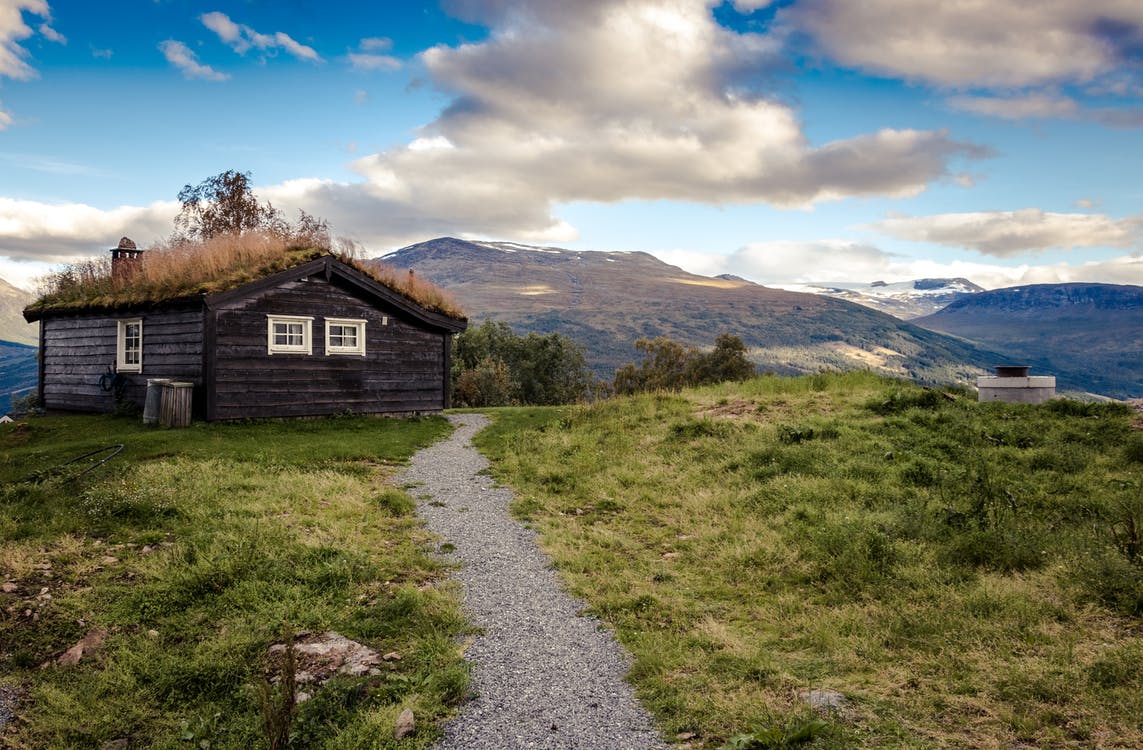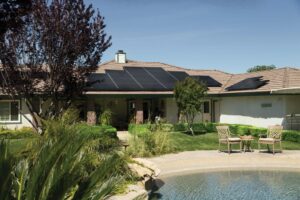To lead a more sustainable and independent lifestyle, many people choose to live off the grid. But what does “off the grid” mean? According to Merriam-Webster, the term off the grid was first used in 1978. It meant not being connected with the electrical grid, the interconnected system that provides electricity. Later, the term expanded in meaning to refer to other public utilities like water, gas, and community sewage and drainage systems. Alternatively, off the grid can mean being unrecorded and untraceable, and being absent from social media sites.
Even though cutting off from technology, especially the internet, and isolating from other people can be one way of going off the grid, it is not the only way of living off the grid. After all, not everyone wants to get their own cabin out in the woods, even if that cabin is located in flowery fields close to a waterfall.
For most people, living off the grid is about leading an independent lifestyle, in which they are as little reliant on external resources as possible. This can mean anything between producing your own electricity, growing your own vegetables, and doing all the work around the house by yourself.
What constitutes living off the grid?
To understand what living off the grid looks like, let us take a closer look at the different things that go into creating an independent and sustainable lifestyle.
1. Shelter
When you have decided to live independently and sustainably, the first thing you need is a place for living. While some people may choose to live in cabins or mini-buses and trailers, most choose to live in a house of their own. This is really the first step in living a sustainable lifestyle, and at this stage, one should familiarize themselves with their state’s rules and regulations to ensure that they stay within the law.
2. Water Source
If you decide you want to cut off the community water source for your home, you will need an alternative water supply, both for drinking and household activities. There are several options in this regard. You can select a location that is close to a natural water source. You may also dig a well or install an electric pump.
A good option is to have in place a rainwater collection system, which can then be used for meeting your daily requirements. For drinking purposes, it is essential to treat the water or boil it before consuming it.
3. Power Source
When you decide to no longer avail the electricity provided to your locality, it will be necessary to set up an alternative power source. From cooking food to having heat and light in the house, it is quite essential to have a constant supply of some fuel. While traditional options include natural resources like wood and dry animal manure, modern-day methods like solar or wind generators are increasingly becoming popular. In fact, many people who do not know about off the grid lifestyle incorporate these methods into their households to help reduce costs.
4. Food Source
Some people choose to entirely forego food options available in markets in favor of natural, home-grown crops, with occasional fishing and hunting to incorporate meat into diet. While such extreme measures are rarely needed, it is always useful to have your kitchen garden for growing fruits and vegetables at home. This helps you cut down costs, reduce visits to the farmer’s market, as well as have access to an assortment of healthy meal options right at home.
5. Waste Disposal
When you cut off the connection with the sewage system in your locality, it is crucial to replace it with another system that is just as efficient, since a lack of proper waste disposal system can lead to the transmission of various bacterial diseases. After familiarizing yourself with the regulations surrounding waste disposal in your area, you can choose a system of waste disposal that works for you. Composting toilets and outdoor toilets or latrines are a common method of waste disposal.
Septic tanks are also a good option for disposing of human waste. These collect waste material and release waste matter onto empty fields via perforated pipes that are buried within the ground. Septic tanks generally need to be emptied yearly. Household garbage can be disposed of by burning it regularly, while vegetable and plant waste may be composted.
6. Security
Once you have got all the basics covered, including water, fuel, and food sources, as well as waste disposal systems, you are set to living on your own. However, security precautions should also be an important consideration and not an after-thought. Having a sound security system in place keeps you safe from dangers of all kinds – from wildlife to thieves and burglars.
Advantages of Living Off the Grid
Leading a life in which you do not rely on anyone for your basic needs comes with definite advantages. Let us look at some of those advantages below.
-
Self-reliance
Catering to all your basic needs by yourself is an empowering feeling, and if you are someone who values self-reliance, chances are this can be the most fulfilling decision of your life. Growing food with your own hands, looking after power and water sources, and taking care of your home’s security is part of the deal, and results in your feeling autonomous and independent. Taking charge of your life boosts confidence and becomes a source of personal satisfaction.
-
Sustainability
Living off the grid essentially means living a more sustainable life. Since you grow your own food and use renewable sources of power, you effectively reduce the number of resources you consume, and that is beneficial for the environment. The result is a lowered carbon footprint, which is ultimately good for the planet.
In the future, more and more people will opt for sustainable ways of living as this is the only way to protect our planet and keep its resources from depleting.
-
Saves Money
One of the top reasons that living off the grid is so desirable is that it helps lower down expenses and enables you to save money. As you stop receiving utility bills and reduce visits to the grocery store, your savings gradually increase, and you can get back the initial money you invested in setting up power and water sources.
Embracing the Off the Grid Lifestyle
While some people choose to go entirely off the grid, others incorporate select components of this lifestyle into their daily lives. Some choose to grow their food but use the community’s water supply; others have their own water and power supplies but decide to use the local sewage system.
Ultimately, the definition of the off the grid lifestyle is not set in stone, and you can pick and choose what suits you best.
Conclusion
Off the grid is a sustainable lifestyle that is based on self-sufficiency and self-reliance. However, it requires significant changes in the way you lead your life, and that is why not everyone can adopt this lifestyle. Still, many people are already doing things to save money, conserve energy, and protect the environment.


